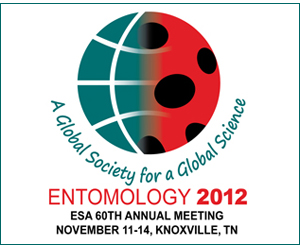North Central Branch Annual Meeting Online Program
Effects of temperature and host on the development of Lysiphlebus testaceipes (Hymenoptera:Braconidae)
Monday, June 4, 2012: 10:27 AM
Chancellor 2/3 (Embassy Suites)
The soybean aphid, Aphis glycines, is an important pest of soybeans. This exotic aphid is attacked by a variety of natural enemies in Wisconsin, including the native parasitoid wasp Lysiphlebus testaceipes. This parasitoid oviposits in a living aphid, and the immature wasp completes its development inside the aphid. L. testaceipes attacks a wide range of aphid species. This study compares development of L. testaceipes in three of its hosts, A. glycines, Schizaphis graminum, and Rhopalosiphum padi, across a range of temperatures. This study seeks to understand the effects of temperature and host species on rate of parasitoid development, percent of adult parasitoid emergence from aphid mummies, and sex ratio for L. testaceipes. Parasitoids were reared at constant temperatures of 12,16,20,24, or 28 degrees Celsius. Time from oviposition to mummification and from mummification to adult emergence was recorded, as well as the sex ratio of adult parasitoids produced. This work may have implications for the seasonal activity of L. testaceipes.


